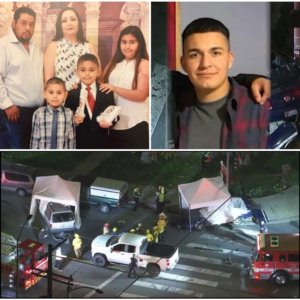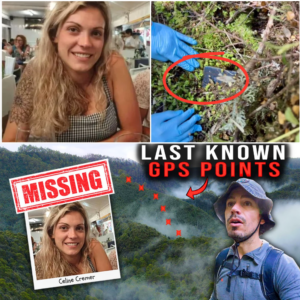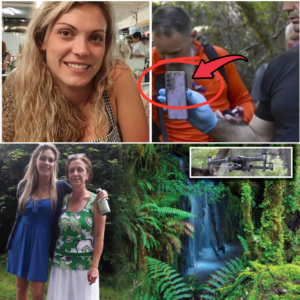In the heart of New Britain, Connecticut—a city often overshadowed by the bustling energy of nearby Hartford—the discovery of a young girl’s remains has unleashed a torrent of grief, outrage, and unanswered questions. On October 8, 2025, police responded to reports of suspicious activity at an abandoned property on Clark Street, where they unearthed a large plastic storage container tucked behind a dilapidated fence. Inside was the decomposed body of 12-year-old Jacqueline “Mimi” Torres-Garcia, a once-vibrant child whose life had been marred by isolation, abuse, and ultimately, a heartbreaking end. What makes this tragedy even more chilling is the account from a local neighbor who witnessed the suspects maneuvering the very container days before its grim contents came to light. Jamilet Delarosa, a resident just blocks away, described a scene that now haunts her: a red plastic bin loaded into a stationary car, her dog barking frantically, and an inexplicable sense of unease that she couldn’t shake.
Delarosa’s story, shared in the wake of the arrests, adds a layer of human horror to an already devastating case. Living on Tremont Street, mere minutes from the abandoned Clark Street building, she first noticed something amiss the week prior to the discovery. “My dog was acting strangely around a car that had been parked in the area for weeks,” Delarosa recounted, her voice steady but laced with disbelief. The vehicle, a nondescript sedan, sat idle near the suspects’ apartment building, gathering dust and drawing no apparent attention. But on that fateful Wednesday—October 2, as she later pieced together—the car’s occupants, whom she recognized as neighbors including Karla Garcia and her boyfriend Jonatan Nanita, were loading a bulky red container into the trunk. “There’s nothing in the car but that container,” she observed. “There’s no evidence it’s been driven. It’s just weird that a red container in that car that’s been there for weeks, not been moved or not been touched. It was kind of weird.” Her dog’s persistent agitation, circling the vehicle and growling low, only amplified the oddity. Delarosa didn’t intervene at the time—why would she? In a neighborhood where people mind their own business amid the grind of daily life—but in hindsight, those moments replay like a nightmare she wishes she could rewrite.
The container, police now believe, held Mimi’s remains, which had been concealed for nearly a year following her death in the fall of 2024. Authorities allege that after the girl’s passing from prolonged physical abuse and severe malnourishment in their Farmington home, Karla Garcia, 29; her boyfriend Jonatan Nanita, 30; and her sister Jackelyn Garcia, 28, engaged in a desperate conspiracy to hide the evidence. Instead of alerting authorities or seeking medical help, they stored the body in the basement of their Wellington Avenue condominium. When the family relocated to New Britain in March 2025, the container was transported with them, eventually dumped behind the vacant Clark Street property. Nanita, according to investigators, was the one who physically disposed of it on October 8, prompting the anonymous tip that led officers to the site. The advanced state of decomposition made identification challenging, but dental records and DNA confirmed the remains as Mimi’s, shattering the fragile normalcy of the neighborhood.
New Britain, with its mix of working-class families, immigrant communities, and historic brick rowhouses, isn’t unaccustomed to hardship. But this case has struck a raw nerve, evoking comparisons to other high-profile child abuse tragedies that expose cracks in the social safety net. Mimi’s story begins not in violence, but in vulnerability. Born in January 2013 while her mother was detained on unrelated charges, she was immediately placed with her paternal grandmother, Patricia Delgado, in New Britain. Delgado provided a loving, stable environment, raising Mimi alongside her younger sibling amid family gatherings filled with laughter and simple joys. “She had the biggest smile,” recalled aunt Lizabeth Meza, who last saw Mimi over four years ago. “She lit up when she heard her grandma’s voice.” Custody battles ensued between Karla Garcia and Mimi’s father, Victor Torres, with courts awarding joint guardianship in May 2022 after assessments deemed the parents ready. By June 2024, Garcia secured sole custody, a ruling that returned Mimi to her mother’s care full-time.
What followed was a descent into isolation. The family moved to Farmington, about 20 miles west of New Britain, where Mimi was withdrawn from public school in August 2024 under the guise of homeschooling. Connecticut’s lax regulations on home education—no mandatory affidavits or wellness checks—allowed this transition to go unquestioned. On August 26, 2024, Garcia filed a withdrawal notice with the New Britain School District, citing a new address in Farmington and intent to instruct at home. No follow-up occurred, shielding the household from scrutiny. Neighbors in Farmington, like Russell Erickson of the Wellington Avenue condominiums, remember glimpses of Mimi’s fragile existence. Erickson often spotted the slight girl struggling to heave garbage bags into the communal dumpster, her arms barely strong enough for the task. “I’d help her, and she’d say ‘thank you’ in this quiet voice,” he shared, his eyes welling up. “Heart-wrenching, that’s what it is.” He never suspected the extent of her suffering—bruises hidden under long sleeves, meals skipped to appease volatile adults—but wishes someone had noticed her frailty sooner. “I can’t believe nobody suspected anything,” Erickson lamented.
Back in New Britain after the move, the family’s Tremont Street apartment became a hub of secrecy. Delarosa and other neighbors described Garcia as reclusive, rarely seen with children despite claims of a bustling household. Another resident, identified only as White in local reports, lived in the same building and exchanged texts with Garcia about a potential podcast collaboration. Days before the arrests, Garcia messaged her: “I didn’t put my daughter in that container and throw her like she’s a piece of trash.” White, stunned upon learning of the connection, called it “disturbing” and “heartbreaking,” a sentiment echoing through the community. On the night of Karla Garcia’s arrest—October 12, outside the Tremont Street building—crowds gathered, shouting “Where’s the girl?” as officers led her away in cuffs. The raw anger was palpable, a mix of betrayal and sorrow for a child they barely knew.
The arrests unfolded rapidly, a testament to swift police work amid the horror. On October 12, Karla Garcia was charged with murder under special circumstances, conspiracy to commit murder, tampering with evidence, and additional counts related to cruelty and risk of injury to a minor. She faces a $5 million bond. Her sister Jackelyn was nabbed the same day on charges of unlawful restraint, intentional cruelty to a person under 19, and risk of injury, held on $1 million. Nanita, the boyfriend, evaded capture initially but was apprehended in Waterbury on October 13 evening, facing identical murder and conspiracy charges on a $5 million bond. All three appeared in Litchfield Superior Court on October 15, transferred to the Part A docket for serious felonies. No-contact orders were issued, and they’re due back on November 14. During the hearing, Karla Garcia entered glaring at supporters clad in “Mimi” memorial sweatshirts, only to break into sobs as charges were read. Jackelyn wept openly, while Nanita, sporting facial injuries possibly from his arrest scuffle, remained stoic.
The investigation, led by New Britain and Farmington police with state support, has uncovered a web of prior red flags ignored by child welfare systems. The Connecticut Department of Children and Families (DCF) had interacted with the family multiple times: brief services in 2014-2016, 2017, and 2021 for sibling-related concerns; a 2022 probe closed for insufficient evidence; and a chilling January 2025 check-in. After allegations surfaced about a younger sibling, DCF verified welfare via a video call where Garcia claimed Mimi was homeschooling and visiting out-of-state relatives. The girl on screen—now believed to be an impersonation by another child—seemed fine, closing the case in March. Acting Commissioner Susan Hamilton has launched an internal review, vowing transparency without jeopardizing the probe. Mimi’s siblings are now in protective custody, a small solace amid the fallout.
Community members like Shannon Leary, who lives across from the Clark Street site, express heightened vigilance. “My kids play right over there,” she said, gesturing to the now-cordoned yard. “It’s nerve-wracking. I’ve got to keep an extra eye out.” Steve Niemczyk, another local, noted the sudden influx of detectives blocking the street: “A quiet area, no problems—then this.” A makeshift memorial has bloomed at the site—teddy bears, flowers, handwritten notes—drawing mourners who whisper prayers for Mimi’s soul. Mayor Erin Stewart, a mother herself, decried the lack of ties between suspects and the dump site, calling for accountability. Paternal relatives, including Victor Torres and stepmother Frances Melendez, learned of Mimi’s fate from police after losing contact around her January 2025 birthday. Delgado, the grandmother, blames the courts for prioritizing reunification over stability.
This case has ignited calls for reform, spotlighting homeschooling loopholes that enabled isolation. Over three years, thousands of Connecticut children have exited public schools unchecked, a vulnerability exploited in past abuses. Experts urge mandatory registrations, periodic visits, and inter-agency data sharing. Retired Hartford detective Brian Foley emphasized the ongoing grind: canvassing neighborhoods, sifting school and financial records. “They’ve got a lot of work ahead to prove the case airtight,” he noted.
As New Britain heals, Delarosa’s account lingers as a poignant what-if. Her dog’s instinctive warning, the unmoving car, the heavy container—signs overlooked in the rush of life. For Mimi, whose brief years were stolen by those meant to protect her, the neighbor’s words serve as both epitaph and indictment: a cry from the ordinary that might have saved her, if only heard in time. The outcry demands not just justice, but systemic change, ensuring no other child’s silence goes unbroken.



